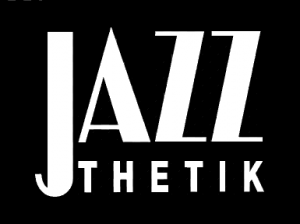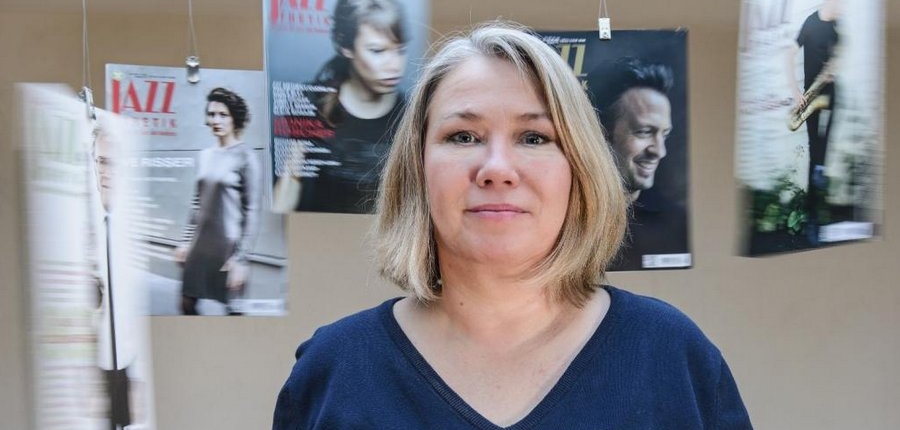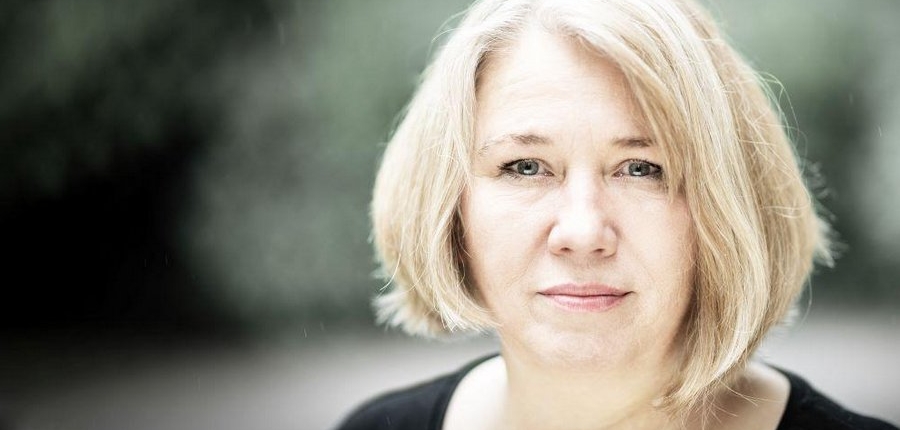#WomenToTheFore 7: Christine Stephan
from: European Jazz Network
We talk to Christine Stephan, founder, owner, publisher, editor and part-time editor-in-chief of the magazine JAZZTHETIK Magazin für Jazz & Anderes based in Münster.
Can you tell us about your early career and your journey into music media and journalism?
I didn’t follow a straight path into music journalism. It was rather a zigzag course that finally brought me here. However, it was clear to me relatively early on that I wanted to work independently, but of course that wasn’t exactly defined at the time.
My path went via education, sculpture, interior design, a detour into theatre, and finally, by chance, into graphic design. I was immediately fascinated by the technical possibilities and the people who worked there. I suddenly got the opportunity to do media design and work on a magazine, to learn from scratch. That was great and to this day I am very grateful for this gift.
What led you to set up JAZZTHETIK in 1987?
Music has always been an important part, in a way the basis for everything that has moved me. I was and am very open to genres, so jazz and improvised music were part of my life from a very early age.
In the end, I wanted to read a good German-language jazz magazine, but it didn’t exist in the way I wanted. So I had to do it myself. That sounds casual and easy in retrospect, but of course it was not. I was the only woman in my editorial team, the youngest of all the staff and also a career changer. That was not so easy for everyone. The men around me had to learn to accept me in my role as boss and I had to learn to assert myself. You have to be stubborn.
And what did you want to achieve?
I wanted to produce a really good jazz magazine and I assumed that people who are interested in this music are also interested in other art and culture – they go to the theatre or cinema, read interesting books etc. But I didn’t want to launch another ‚art magazine‘. There were already very good ones published by big media houses.
I was inspired by the aesthetics and content of publications like the British WIRE; the literary magazine TRANSATLANTIK (which unfortunately no longer exists); but also the political magazine SPIEGEL. I think that politics, culture and economy always go hand in hand. Prosperity is only possible if everyone can develop.
JAZZTHETIK is one of Europe’s leading jazz and improvised music magazines. How has the magazine developed in the last thirty years?
Music has changed in over thirty years, and a medium that reports on it must do the same. After all, you can’t stand still while the world keeps turning. I still remember discussions in the editorial office about whether so-called world music has a place in the magazine. That stopped with Peter Kowald’s Global Village.
I still think that the interesting thing is not the pigeonhole into which music is sorted, but the quality of the music. With this attitude, I not only had these discussions in the editorial office, but was also asked at festivals where we often had stands: „What does that have to do with jazz?” Nothing, but that’s not the point. Okay, with our carpet patterns or oil sardines on the covers, we may have overwhelmed some people. But JAZZTHETIK has also developed further. Just like the music.
You can see that in many things, not only in the outward appearance. For example, we no longer have so much ‚& other‘ content, such as theatre or dance reports, but literature and film etc are still topics that we like to explore.
What have been the main challenges and opportunities?
But challenges and opportunities are the same thing. Aren’t they?
Of course, like everyone, the pandemic presented us with problems we didn’t even know existed. But when all the live acts were cancelled or postponed, and at the same time the magazine shops had to close, it gained us more subscriptions at the beginning and finally gave us the trigger to go to market with a purely digital version. The great response showed that it was really the right time for this, but that it had been worth waiting until we had found a system that met our ideas both visually and technically.
What’s your role with the magazine now and what aspects do you find most rewarding?
In the beginning, we tried to work as a collective, but that didn’t work out. Of course, there have been changes in the JAZZTHETIK team over the years. At the moment I have a team that operates very well together, so I have more time for picture editing, travelling and private things. Even though I now have more room for things I enjoy, I am still the publisher and editor and therefore responsible for everything. But having a little more breathing space to be creative again is very nice.
Who are your readers?
Good question! Unfortunately, we don’t have a current reader survey, but we know from past surveys that we address an age group of 23 to 70 years. They are 70% male and work in the broadest sense ‚culturally‘, i.e. as musicians, teachers, in cultural offices, etc. But it is also noticeable that we have a lot of doctors among our subscribers.
And what’s your approach to fostering a sense of community and connection with readers and artists?
I believe that a print magazine is also a statement. So if you make it recognisable to the outside world, for example by posting content from the current issues on social media or placing the magazine as a so-called ‚coffee-table-magazine‘, that is a statement. Just like when you wear branded clothing. It helps to make it easier to identify within a group. I was once told by a musician that he would love to be portrayed in JAZZTHETIK because he feels that we are like a gang and he would love to be part of that gang.
How do you think representation of women and non-binary people has evolved in jazz and creative music in recent years?
I have just noticed that the Europe Jazz Network was founded in the same year as JAZZTHETIK. When I started JAZZTHETIK in 1987, it was the time when female musicians were asked in interviews how it felt to be a woman on stage. I remember Joëlle Léandre kicking out a journalist after this question and found her reaction unusual, but also appropriate. That was a good example for me and I followed it when I was asked if it was possible to do a jazz magazine as a woman.
Many people in my social environment are of course aware of the need for a tolerant and equal society. That has probably always been there, it’s just that new terms have been found for it in some cases. On the other hand, there is of course also a very conservative attitude. This is surprisingly independent of gender for me, but I also don’t know what people who are against equal rights are afraid of.
Can you highlight any up-and-coming female and non-binary artists that our members should look out for?
Anohni and Kae Tempest are certainly well-known names, and it is definitely worthwhile to take a closer look at these artists. I can’t make up my mind about which female musicians to highlight. There are so many good ones!
In a time dominated by digital media, what role do you believe print magazines like JAZZTHETIK have in highlighting jazz and creative music? What unique advantages does a print magazine offer music lovers and artists?
A print product is more sustainable, and I mean that in the true sense of the word. Studies have shown that content that is read ‚analogue‘ stays in the memory longer than ‚digital‘ content. The haptic experience alone is a stimulus that cannot be conveyed digitally. Likewise, the willingness to read a longer text is much higher in the analogue version than in the digital version. That all speaks in favour of print.
Nevertheless, JAZZTHETIK is adapting to the digital world. Even though I personally find a print product much more aesthetically pleasing, I appreciate the advantages, such as immediate availability worldwide.
As a journalist, editor and publisher, what advice would you give to aspiring writers looking to enter the music media field?
You shouldn’t listen to the advice of others. You have to make your own experiences. And you must never lose your sense of humour. Then it will all work out.
What are your future ambitions for the magazine?
It is very important to me to remain independent. Economic constraints sometimes make it seem tempting to compensate for this by creating more advertorial content, but then it would no longer be the magazine I want to read. And I believe that many of our subscribers would feel the same way.
Where do you want to take it next?
JAZZTHETIK is a recognised training company and has already helped several young people to complete an apprenticeship, partly in cooperation with a youth welfare organisation that specifically works with socially disadvantaged people. I would like to expand this in the future.
Photographer credits:
1) Liudmila Jeremies
2) Thomas Kölsch
3) Liudmila Jeremies








